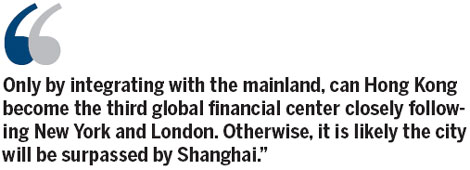Future of HK finance relies on mainland
Updated: 2013-09-18 06:51
By Zhou Bajun(HK Edition)
|
|||||||||
The fourth Xinhua-Dow Jones International Financial Centers Development Index released on Sept 10 showed that, among 45 cities in the world, Hong Kong moved up the rank of influential financial centers from fourth last year to third this year. Only New York and London are ahead of Hong Kong. Though it is a piece of good news for Hong Kong, it doesn't mean Hong Kong is the third most significant global financial hub.
Looking at the horizon, there are none that come close to New York and London as world-class financial centers. As a global financial hub, either New York or London is top in the global exchange market, inter-bank market, stock market, bond market, future market, derivative market, etc. Regretfully, here in Hong Kong, only the stock market is comparable to that of New York or London, but all other financial markets are far behind.
Six years ago, in an opinion piece "HK must strive to be top world financial hub", published in this newspaper on Dec 5, 2007, I advocated that the city should be a third world-class financial hub. Since then, more than 2,000 days and nights have elapsed, but the city has merely maintained the status quo - still a regional financial center. Moving up from fourth to third as acknowledged by the ranking list is temporary progress that is quantitative rather than qualitative.
Meanwhile, the Xinhua-Dow Jones index should sound alarm bells for Hong Kong. Although Shanghai remained the world's sixth most influential financial center, the city made great improvements in both financial services and regulatory conditions, especially as it has been at the top in the development and growth indicators for four consecutive years. The index shows Shanghai has tremendous potential for further growth.
Today nearly everybody in the world admits China is emerging as a great power in the 21st century. Being the second-largest economy in the world, China has the capacity to become a world-class financial hub in the foreseeable future. The question is: whether or not Hong Kong or Shanghai will be China's international financial center of global influence?
On a comparison of current financial services, Hong Kong should be ahead of Shanghai. It is why central authorities have selected Hong Kong to develop the renminbi offshore market. However, Hong Kong has a fatal disadvantage. Six years ago, the Report on Economic Summit on "China's 11th Five-Year Plan and the Development of Hong Kong" announced in January, 2007: "The development of the financial services industry in Hong Kong has been restrained on one hand by the relatively small scale of our local economy, and on the other, by the co-existence of several financial centers in Asia." So, Hong Kong's economy should integrate with the mainland in order to lengthen the city's financial arm and expand its economic hinterland as well. Only by integrating with the mainland, can Hong Kong become the third global financial center closely following New York and London. Otherwise, it is likely the city will be surpassed by Shanghai.
The pilot Shanghai Free Trade Zone will put up its plate very soon. Undoubtedly, the zone will equip Shanghai with a new engine of development, helping it realize the long-term ambition of being an international financial, trade and transportation hub by 2020.
Hong Kong has wasted too much time over fierce political struggles. While Shanghai advances, the territory paces up and down. Six years ago, elites from Hong Kong's financial industry acknowledged that the rapid economic development and the reform of the financial services sector of the mainland during the 11th Five-Year Plan (2006-10) period provided enormous opportunities to the city's financial services. But, even as the mainland is implementing the 12th Five-Year Plan (2011-15), the opposition camp in Hong Kong is making every effort to stop the integration between Hong Kong and the mainland by trying to duplicate the Western political model in the HKSAR.
Recently, the most ridiculous stunt attempted by the opposition was when a group of 300 people published an advertisement in two local newspapers, and one Taiwan newspaper, in which the new migrants from the mainland were blamed for the chronic problem of the territory's housing shortage. Opening the territory's door wider to mainland visitors under the Individual Visit Scheme was also blamed for disturbing local citizens' lives.
Ostensibly, the emotions on livelihood issues here attributed to the mainland's visitors and migrants are running high. Substantially, the conflicts over political and ideological matters between Hong Kong and the mainland are profound with far-reaching implications on the territory's development. Only after overcoming obstacles on the path of constitutional development, and with universal suffrage in particular, can Hong Kong smoothly accelerate economic integration with the mainland and aspire to being the third world-class financial center.
The author is a veteran current affairs commentator.

(HK Edition 09/18/2013 page9)